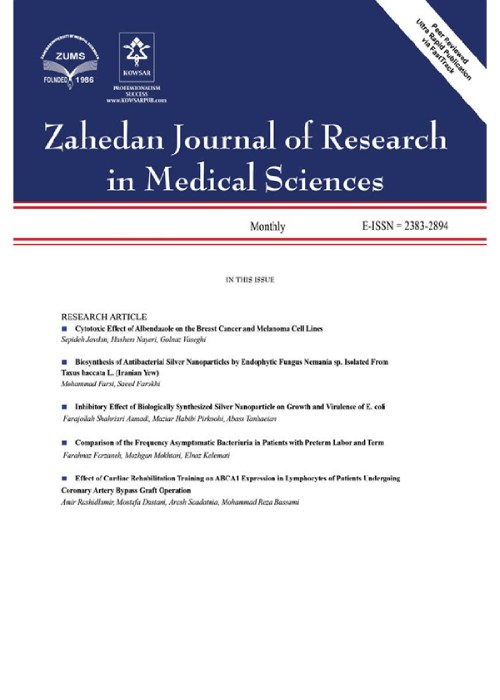Comparison of Antimicrobial Effect of Pistacia atlantica with Antibiotics in Urinary Tract Infection
Author(s):
Article Type:
Research/Original Article (دارای رتبه معتبر)
Abstract:
Background
Enterobacteriacea are able to cause urinary tract infections, and Escherichia coli (E. coli) and Klebsiella pneumonia are the most frequently isolated pathogens from urinary samples. Untreated urinary tract infections can cause upper and lower urinary tract infections. These are among the most common infectious diseases in children. Septicemia and antibiotic resistance of urinary bacteria are the most important concerns in the developed and developing countries. One of the solutions for antibiotic resistance is herbal therapy, which as a branch of traditional medicine, has served an important role in disease treatment during the past century. The advantages of herbal therapy include minimum complications, cost-effectiveness, and high popularity. Herbalism has had a significant role in disease treatment. In this study, the antimicrobial effect of Pistacia atlantica was investigated in 2014.
Methods
This cross-sectional study was performed on 150 patients with positive urinary cultures in Imam Ali Hospital of Zahedan, Iran. All the cases of positive culture during three months were investigated. Extraction of ethanolic extract of Pistacia atlantica was performed by a rotary device. Firstly, the antibacterial effect of Pistacia atlantica was assessed with the disk diffusion method at four concentrations, and then for bacteria that were sensitive to this extract, minimum inhibitory concentration (MIC) and minimum bactericidal concentration (MBC) were determined. Antibacterial effect of Pistacia atlantica ethanolic extract on urinary tract infection was compared with some conventional antibiotics, and the data were analyzed using Chi-square test in SPSS.
Results
E. coli, Klebsiella pneumonia, and Staphylococcus aureus were isolated from urinary samples. Ethanolic extract of Pistacia atlantica created maximum non-growth halo at the concentration of 100 mg/mL, but at the 12.5 and 25 mg/mL concentrations the extract created minimum non-growth halo, indicating the bacteria were resistant in these concentrations. Overall, 27 of 150 bacteria showed sensitivity to Pistacia atlantica at the 50 and 100 mg/mL concentrations. The most sensitive bacteria to this extract were E. coli and Staphylococcus aureus, respectively.
Conclusions
The results presented the antibacterial effect of ethanolic extract of Pistacia atlantica is higher at higher concentrations.Keywords:
Language:
English
Published:
Zahedan Journal of Research in Medical Sciences, Volume:20 Issue: 7, Jul 2018
Page:
5
magiran.com/p1888897
دانلود و مطالعه متن این مقاله با یکی از روشهای زیر امکان پذیر است:
اشتراک شخصی
با عضویت و پرداخت آنلاین حق اشتراک یکساله به مبلغ 1,390,000ريال میتوانید 70 عنوان مطلب دانلود کنید!
اشتراک سازمانی
به کتابخانه دانشگاه یا محل کار خود پیشنهاد کنید تا اشتراک سازمانی این پایگاه را برای دسترسی نامحدود همه کاربران به متن مطالب تهیه نمایند!
توجه!
- حق عضویت دریافتی صرف حمایت از نشریات عضو و نگهداری، تکمیل و توسعه مگیران میشود.
- پرداخت حق اشتراک و دانلود مقالات اجازه بازنشر آن در سایر رسانههای چاپی و دیجیتال را به کاربر نمیدهد.
دسترسی سراسری کاربران دانشگاه پیام نور!
اعضای هیئت علمی و دانشجویان دانشگاه پیام نور در سراسر کشور، در صورت ثبت نام با ایمیل دانشگاهی، تا پایان فروردین ماه 1403 به مقالات سایت دسترسی خواهند داشت!
In order to view content subscription is required
Personal subscription
Subscribe magiran.com for 70 € euros via PayPal and download 70 articles during a year.
Organization subscription
Please contact us to subscribe your university or library for unlimited access!


